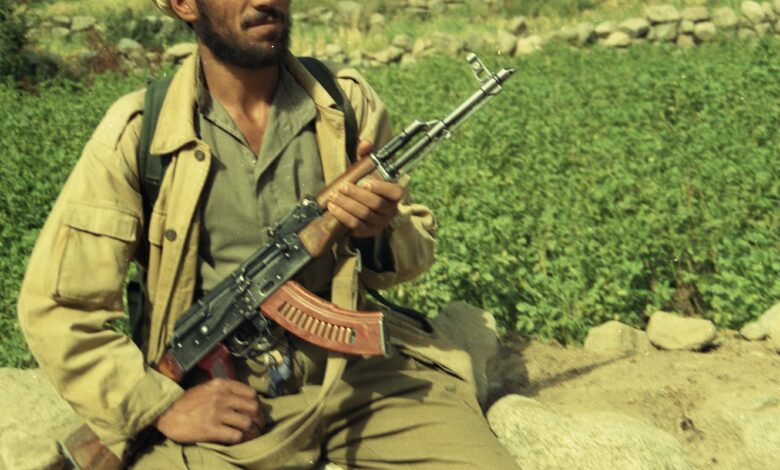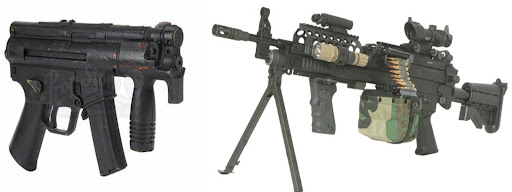Nigerian Terrorists Hold 1% Of All Firearms In West Africa, Says Gun Control Body
The Nigerian government has set up an organisation to stop the spread of small arms through the country. The National Centre for the Control of Small Arms and Light Weapons says it is on a mission to take weapons off the streets and out of the hands of terrorists.

Terrorists and insurgent groups in Nigeria hold one out of every hundred illegal firearms in West Africa, according to new research.
There are at least seven million illegally held assault rifles and other small arms across the West African region, according to a governmental arms control body.
In the Lake Chad area, Boko Haram and ISWAP are in possession of about one percent of that total, the government body set up to monitor the spread of weapons in Nigeria says.
This amounts to at least 77,000 small arms and light weapons in the hands of organised terrorist groups in the northeast.
Officials of the National Center for Control of Small and Light Weapons (NCCSALW), a regulatory body established in May 2021 by the Nigerian government, provided this information to HumAngle.
The NCCSALW operates under the Office of the National Security Adviser (ONSA), as the institutional framework for the regulation and control of small arms and light weapons.
And since 2009, the numbers of small arms has continued to increase across the country, especially in the northern region where Islamist groups like Boko Haram, JNIM, and ISWAP are in the northeast. In the northwest, lawless areas have meant weapons have become a common sight, brandished by other smaller terrorist groups.
But the organisation does not want to comment on where these weapons come from.
It has been reported that since 2009, over 350,000 people have died as a result of the armed conflict in northeast Nigeria.
In Borno state, the epicentre of the Boko Haram conflict, an estimated 35,646 people on both sides have been killed in violence since 2009. The Boko Haram terrorist has also been blamed for the 5,747 killings in Zamfara; 5,462 in Kaduna; 4,097 in Adamawa, 3,774 in Benue; 3,359 in Plateau, and 3,176 in Yobe.
To curb the spread of dangerous weapons, the Nigerian government decided to set up the NCCSALW.
Rear Admiral Abdulrahim Shuwa, a retired Naval officer, is the head of the Northeast Zonal office of the NCCSALW in Maiduguri, Borno state.
“When conflicts end or subside, small arms remaining in circulation may lead to additional violence and suffering since fighting can resume or conflicts may erupt in neighbouring regions,” he said.

“When small arms and light weapons are not mopped up in non-conflict areas, they could easily be used in perpetrating criminal violence or may be used in homicides, suicides, robbery.”
But Rear Admiral Shuwa would not be drawn on the source of the weapons in circulation, that information was not part of his organisations “area of reference”, he insisted.
Rear Admiral Shuwa said it had been previously established that there are about 875 million small arms worldwide, produced by 1,200 companies in 90 countries that produced small arms and light weapons.
“They kill between 500,000 and 750,000 people annually,” he said.
“There are estimated seven million small arms and light weapons in the West African subregion, out of which over 77,000 are in the hands of major West African groups like ISWAP and Boko Haram,” he said.
“That is why small arms have mainly fueled the conflict in Cote d’Ivoire, Guinea Bissau, Liberia, Senegal, Sierra Leone Togo and the subregions like Nigeria, which is still struggling to overcome the ongoing conflict.”
The establishment of the NCCSLAW was in line with the requirements of article 24 of the Ecowas Convention For The Establishment of Small Arms and Light Weapons Commissions by all 15 member states in their efforts to end the proliferation of firearms in the region.
“Thus, the NCCSALW is mandated to lead a multi-stakeholder process involving civil society organisations in the implementation of all national, ECOWAS, and UN plans of action to control small arms.”
Having domesticated that accord, the Nigerian government established six zonal centres in Ado-Ekiti, Calabar, Enugu, Kaduna, Minna, and Maiduguri.
The six offices are tasked with a mission to prevent and control the mushrooming of small arms in collaboration with stakeholders toward strengthening peace and accord.
The NCCSALW has since embarked on advocacy visits to various military and security outfits in Borno state to acquaint the populace about its mission.
Support Our Journalism
There are millions of ordinary people affected by conflict in Africa whose stories are missing in the mainstream media. HumAngle is determined to tell those challenging and under-reported stories, hoping that the people impacted by these conflicts will find the safety and security they deserve.
To ensure that we continue to provide public service coverage, we have a small favour to ask you. We want you to be part of our journalistic endeavour by contributing a token to us.
Your donation will further promote a robust, free, and independent media.
Donate HereStay Closer To The Stories That Matter




